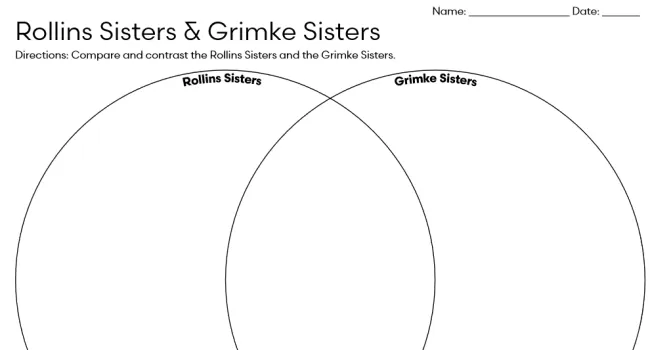The South Carolina Woman Suffrage Association was founded in Columbia in 1870, with Charlotte Rollin as the Chair. A charter is created and sent to Lucy Stone, one of the founders of the American Woman Suffrage Association, and the creation of South Carolina’s only AWSA chapter is approved. Charlotte Rollin and Lucy Stone maintain a correspondence. In 1871, the New York Sun and the New York Herald newspapers publish lengthy interviews with the Rollin Sisters, with scathing criticisms of the Republican South Carolina government. Regardless of the mixed reviews of the Rollin Sisters, there was agreement that Frances Rollin was a celebrated figure in South Carolina’s political circle. Meetings are held in the SC State House to amend the 1868 Constitution to include women’s suffrage, which ultimately fails, and suffrage for women would not come until decades later.
Standards
- 8-5 The student will understand the impact of Reconstruction, industrialization, and Progressivism on society and politics in South Carolina in the late nineteenth and early twentieth centuries.
- USHC-4 The student will demonstrate an understanding of the industrial development and the consequences of that development on society and politics during the second half of the nineteenth and the early twentieth centuries.
- USHC.3.CE Assess the causes and effects of significant turning points in the Populist and Progressive era from 1877–1924.
- This indicator was developed to encourage inquiry into the causes of American expansion, such as a growing and diversifying population and the expansion of the plantation economy. This indicator promotes inquiry into the relationship between sectionalism and political compromise, culminating in the Civil War.
- 8.3.CC Analyze debates and efforts to recognize the natural rights of marginalized groups during the period of expansion and sectionalism.
- 4.5.E Analyze multiple perspectives of the economic, political, and social effects of Reconstruction on different populations in the South and in other regions of the U.S.
- This indicator was developed to encourage inquiry into founding principles as viewed through this period of federal government involvement, the development and realignment of a new labor system not based on a system of slavery, and the significant political realignment of the South.
- 4.4.CC Identify and evaluate the economic, political, and social changes experienced throughout the Civil War.
- 4.4.P Explain how emancipation was achieved as a result of civic participation.





